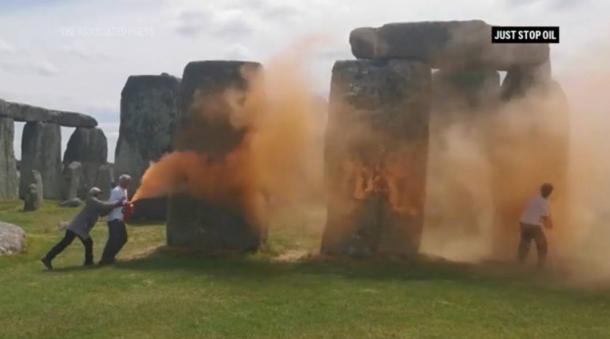🔴 Website 👉 https://u-s-news.com/
Telegram 👉 https://t.me/usnewscom_channel
In the middle of the day of Wednesday, June 19, a group of Just Stop Oil protestors sprayed several stones of the ancient Stonehenge monument with orange paint. Video footage has been captured showing the two individuals in question wearing Just Stop Oil shirts while running up to the monoliths with the canisters of paint, spraying the stone. To stop the two vandals from defacing the stones, members of the public were seen intervening. These videos can be found on social media.
The Just Stop protestors have been identified as Niamh Lynch, a 21-year-old Oxford student and Rajan Naidu, a 73-year-old from Birmingham; both of which have been arrested by police for damaging the protected ancient monument.
Sharing the video, the Just Stop Oil group posted on X demanding:
“…the incoming government sign up to a legally binding treaty to phase out fossil fuels by 2030.”
This same group has stirred up headlines last month when protestors smashed the glass protecting the 13th century manuscript, the Magna Carta, in the British Museum in London.
Screenshot of video showing vandals spray painting Stonehenge. Courtesy of The Associated Press
Located near Salisbury, England, the stone circle dates to the late Neolithic period circa 2500 BC. The primary function of the World Heritage Site is still not entirely understood. We can only speculate its purpose, although, many theories have been suggested. One thing is for certain, the sun rises over the Heel Stone on the longest day of the year (i.e., the Summer Solstice) and sets over it on the shortest day (i.e., the Winter Solstice). This suggests that the prehistoric structure was built to align with the movement of the sun.
Stonehenge. (garethwiscombe / CC BY-SA 2.0)
It is believed that Stonehenge started as a burial ground in its earliest beginning, with deposits containing human bones dating to as early as 3000 BC. While initial work of the henge began about 3100 BC, it would continue to be built in stages over many years and as mentioned earlier, with the large sarsen stones being placed sometime around 2500 BC. Another detail not well known is exactly how the stones were brought to the site; some of which—the bluestones—traveled from southwest Wales over 150 miles (250km) away.
Stonehenge stands as the most famous landmark of the United Kingdom. And while this act of vandalism may have slowed things down for the day, the site remains open. And in anticipation of tourists gathering on Thursday for the longest day of the year, the site manager, the English Heritage, has now published “conditions of entry.”
Top image: The arrested protestors who sprayed Stonehenge Orange. Source: Courtesy of CNN.
